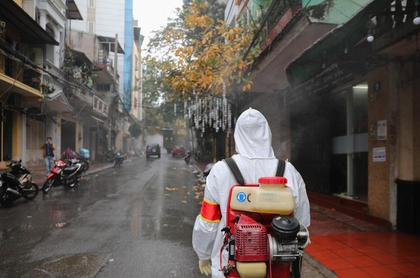Vietnam's capital reports 150 new Covid-19 cases in past week
By IANS | Updated: June 9, 2025 15:03 IST2025-06-09T14:56:34+5:302025-06-09T15:03:31+5:30
Hanoi, June 9 Vietnamese capital Hanoi confirmed 150 new Covid-19 cases in the city from May 30 to ...

Vietnam's capital reports 150 new Covid-19 cases in past week
Hanoi, June 9 Vietnamese capital Hanoi confirmed 150 new Covid-19 cases in the city from May 30 to June 6, slightly down from the previous week, reports said.
Since the beginning of 2025, the capital city has recorded 558 infections, a decrease of 109 cases compared to the same period last year, the report said.
The Hanoi Centre for Disease Control has requested local units to strengthen public communication on Covid-19 and other seasonal diseases, Xinhua news agency reported, citing the Vietnam News Agency.
Meanwhile, Covid cases are once again on the rise in India, with 5,364 active cases currently reported and four deaths recorded in the last 24 hours.
Since January 1, more than 4,700 people in India have recovered from the virus, while 55 fatalities have been reported during this period.
The primary driver of the recent surge is a new coronavirus variant known as NB.1.8.1, a subvariant of Omicron. This strain has been detected in several countries, including the United Kingdom, the United States, Australia, Thailand, China, and Hong Kong.
NB.1.8.1 was first identified in January 2025 and is classified as a "recombinant" variant—meaning it emerged through the genetic mixing of two or more previous strains.
On May 23, 2025, the World Health Organisation (WHO) designated NB.1.8.1 as a "Variant Under Monitoring" (VUM). According to the WHO’s 2023 definition, a VUM is a variant that has undergone genetic changes that may affect the virus’s characteristics. Early data suggests that NB.1.8.1 may spread more easily or grow faster than other variants, though this has yet to be confirmed.
The impact of NB.1.8.1 on health, immunity, and transmission is still being studied. However, lab-based models indicate that the strain binds more efficiently to human cell receptors, suggesting it may infect cells more effectively than earlier variants.
Common symptoms associated with NB.1.8.1 include sore throat, cough, fever, muscle aches, and nasal congestion. Some patients also report gastrointestinal symptoms such as nausea and diarrhoea.
Despite the emergence of this new strain, health experts emphasise that vaccines continue to offer strong protection against infection, severe illness, hospitalisation, and death.
Disclaimer: This post has been auto-published from an agency feed without any modifications to the text and has not been reviewed by an editor
Open in app